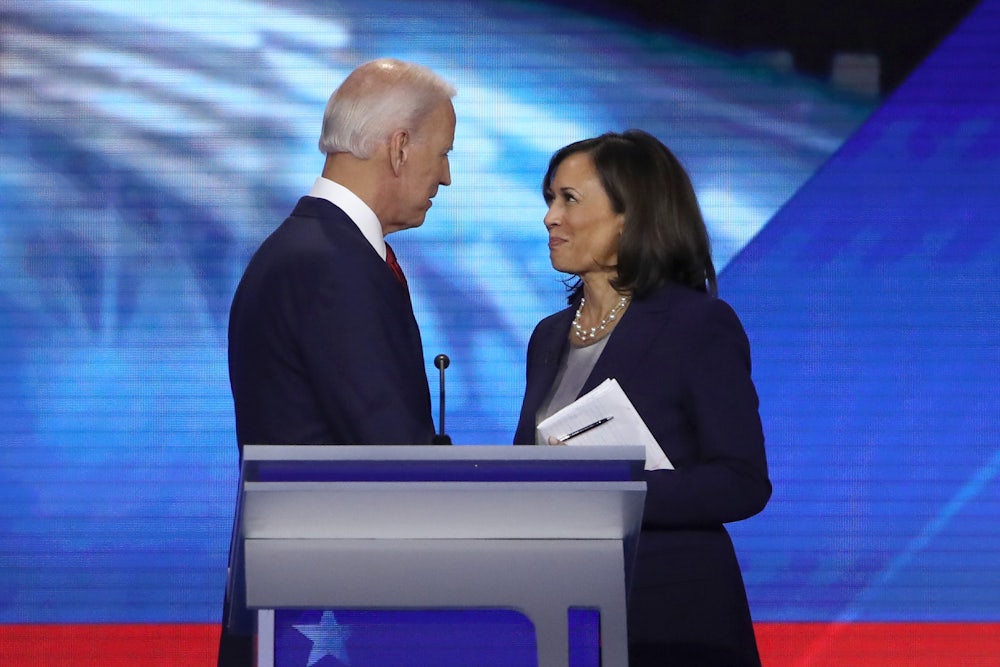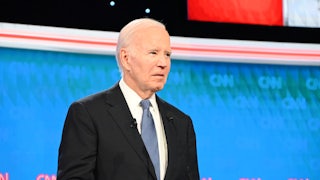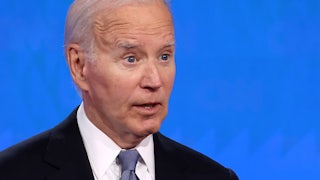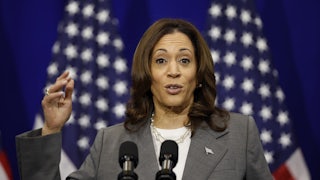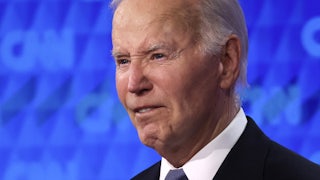As Democrats tear their hair out trying to think through how to navigate the crisis of trust created by President Biden’s painfully faltering debate performance against Donald Trump last Thursday, there is only one graceful way out of this mess, should party leaders and his family convince him to not stand for reelection. A way to turn the narrative capstone of the Biden presidency in the history books from one where he did not run because he was old and feeble to one where he did the boldest thing any American leader can.
Should he decide not to run again, Biden needs to reach back to the country’s founding and the spirit of George Washington and demonstrate, in deed as well as through his many words about American democracy, the power of our commitment to the peaceful transfer of power. He needs to hand the presidency—and his convention delegates—over to Vice President Kamala Harris in August in Chicago.
There would be a lot of particulars to figure out, but for now let’s leave those to the lawyers. The point is that doing this would be a game changer, and it would also cement for him an extraordinary role in history. He would be the man who made it his mission in his waning days to finally break that highest, hardest glass ceiling, giving America its first female president. This after having already stood twice on the ticket alongside America’s first Black president and swept the first female vice president into office during a run that preserved American democracy.
What a political legacy! In a post-Roe world where women voters have been transforming the electoral landscape, it would further elevate female organizing and voting passion, as well as likely boosting Democrats’ faded support with Black voters and especially with critically important Black women voters.
It would explode the stasis of this awful grinding gerontocratic reprise of a presidential contest. It would be something wholly new in American history. And it would be a hell of a spectacle.
Imagine it: The transfer of power, replete with a swearing-in ceremony, teary thank-yous and encomiums and career retrospectives for both the departing president and the new, incoming one. Harris moving from her plain black and brown suits to the jewel tones of a female president, emerging into a national spotlight that has already vetted her. Rather than a reprise of 1968 with protests in Chicago against a president weighed down by war, the convention would take on a poignant, electric, unexpected air.
Why should Democratic delegates back her and not such compelling high-profile governors as Gavin Newsom or Gretchen Whitmer? Because she is the only candidate other than Biden who was on the ticket that won the White House in 2020, and the only one who already has survived having the Eye of Sauron that is presidential-level national scrutiny alight on her. And because Harris today is no longer simply a former senator; she is the incumbent vice president of the United States, the next in the line of succession. There’s no clear-the-field Hillaryism about “it’s her turn” here; it is the constitutional order that if Biden steps down, Harris becomes the president. If he hands the reins to her, she would have been made president by the Constitution and the votes of 81 million in 2020. It is the democratically cleanest solution—much cleaner than a bunch of unelected delegates in Chicago or a pre-August 7 “virtual roll call” selecting a nominee who has never won votes or campaigned nationwide.
Harris could then run as an incumbent, along with a new vice president—a whole ’nother bite at the excitement-generating apple on a Democratic side that has sorely lacked it. This choice could serve, just as Biden did for Barack Obama in 2008, as a reassuring presence. One option could be North Carolina Governor Roy Cooper, should he pass a vetting process that would need to begin soon. Governor Josh Shapiro of Pennsylvania similarly represents a critical voting state, although Shapiro’s presence would require threading a very complicated Israel policy needle. Senator Sherrod Brown of Ohio and Governor Whitmer of Michigan could work, although an all-female ticket might be a bridge too far under the circumstances.
Democrats would get a new ticket while reducing the drama of a convention contest. The role of the electorate would be respected—a vote for Biden has since 2020 always included the possibility of a Harris presidency because of the risk of his dying in office, given his already advanced age—and American history would transformed.
A debate over the willingness to cede power has swirled in this country since January 6, 2021. But the practice could not have a better American lineage. George Washington’s resignation from power in 1783, when he gave up his commission as commander in chief of the Continental Army to return to Mount Vernon is the moment that set the young United States on course to being a democracy, not a dictatorship. Today a painting of that act hangs in the Capitol Rotunda, along with one honoring the Declaration of Independence and some others. Even the Democrats surely ought to be able to spin that.
Should he choose not to run for reelection, ceding the White House to Harris would be one more executive action in a long line of powerful Obama-Biden moves: something designed to set a high-water mark in American history before leaving office, to transform what we think we know about who we can be and that we can remember and reach for again.
